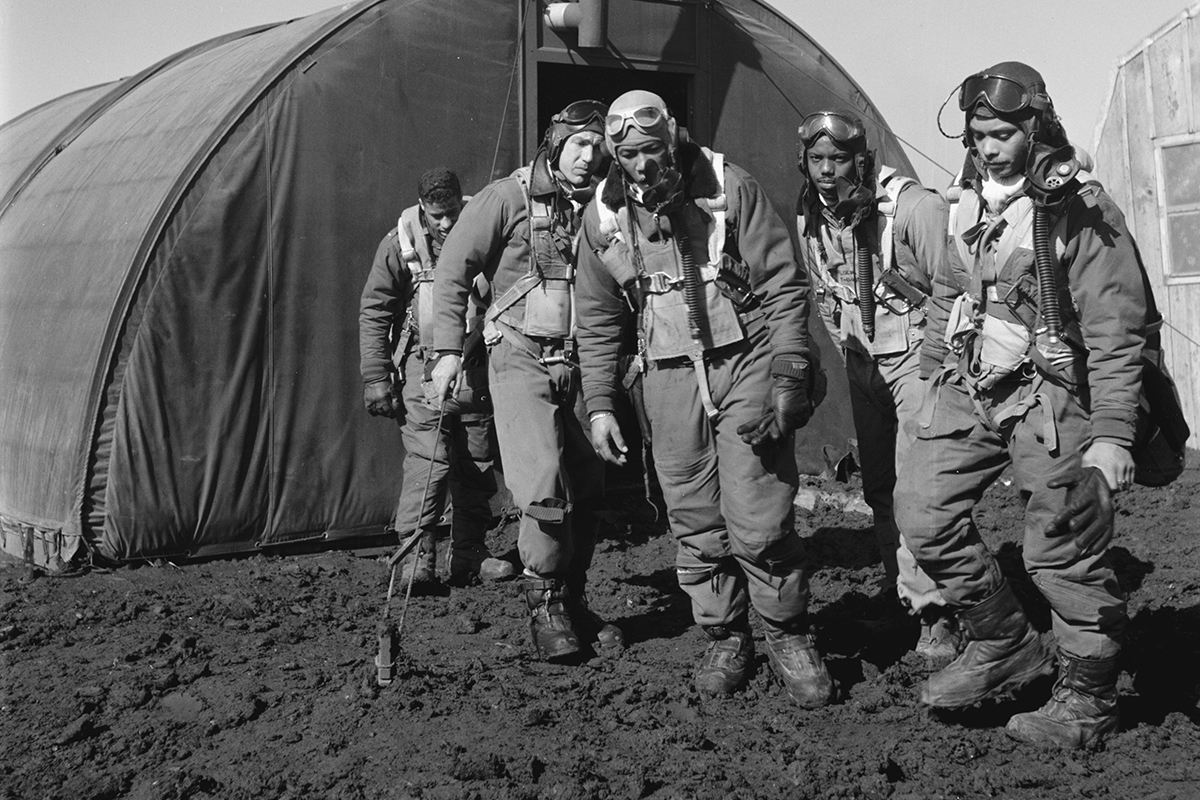
Tuskegee airmen exiting the parachute room, Ramitelli, Italy, March 1945. Photographer: Toni Frissell.
Source: Tuskegee Airmen 332nd Fighter Group pilots, Library of Congress Prints & Photographs Division.
February is Black History Month, a time to reflect on the experiences, contributions, and resilience of African Americans throughout history. This month’s selection highlights the depth and breadth of Black cultural heritage, from groundbreaking achievements to the ongoing struggle for justice and equality. Explore our curated collection of ebooks and streaming films, and visit the rotating display of physical books and media in the main lobby of Hunt Library. Engage with these stories, broaden your perspective, and join the conversation.
Each month, "Discover & Discuss" presents a fresh theme designed to inform, inspire, and connect our community with a curated selection of books and digital resources that invite deeper thinking and dialogue.
Special thanks to our Materials Processing Coordinator, Leah Zande, for compiling this list. Learn more on the DEI events page. Additional Black History Month resources resources provided by Gale Publishing.
eBooks
Black Meme: A History of the Images That Make Us
Russell, Legacy (2024)
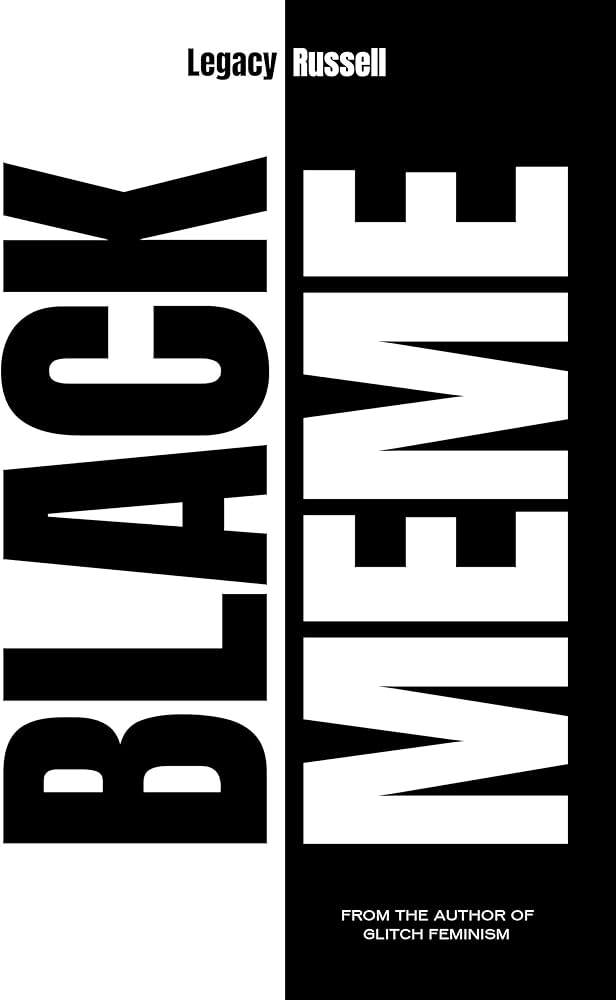 In Black Meme, Legacy Russell, award-winning author of the groundbreaking Glitch Feminism, explores the “meme” as mapped to Black visual culture from 1900 to the present, mining both archival and contemporary media.
In Black Meme, Legacy Russell, award-winning author of the groundbreaking Glitch Feminism, explores the “meme” as mapped to Black visual culture from 1900 to the present, mining both archival and contemporary media.
Russell argues that without the contributions of Black people, digital culture would not exist in its current form. These meditations include the circulation of lynching postcards; why a mother allowed Jet magazine to publish a picture of her dead son, Emmett Till; and how the televised broadcast of protesters in Selma changed the debate on civil rights.
Questions of the media representation of Blackness come to the fore as Russell considers how a citizen-recorded footage of the LAPD beating Rodney King became the first viral video. And the Anita Hill hearings shed light on the media’s creation of the Black icon. The ownership of Black imagery and death is considered in the story of Tamara Lanier’s fight to reclaim the daguerreotypes of her enslaved ancestors from Harvard. Meanwhile the live broadcast on Facebook of the murder of Philando Castile by the police after he was stopped for a broken taillight forces us to bear witness to the persistent legacy of the Black meme.
Through imagery, memory and technology Black Meme shows us how images of Blackness have always been central to our understanding of the modern world. - Publisher's Description
Request this Title
Horror Noire: A History of Black American Horror from the 1890s to Present
Means Coleman, Robin R. (2023)
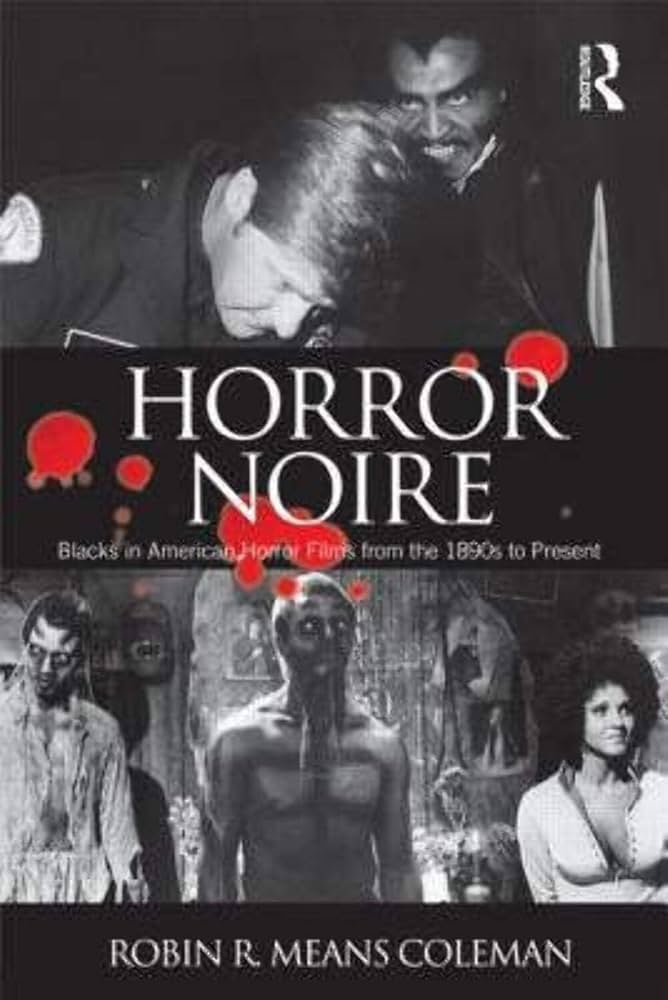 From "King Kong" to "Candyman," the boundary-pushing genre of the horror film has always been a site for provocative explorations of race in American popular culture. In "Horror Noire: Blacks in American Horror Films from 1890's to Present," Robin R. Means Coleman traces the history of notable characterizations of blackness in horror cinema, and examines key levels of black participation on screen and behind the camera. She argues that horror offers a representational space for black people to challenge the more negative, or racist, images seen in other media outlets, and to portray greater diversity within the concept of blackness itself.
From "King Kong" to "Candyman," the boundary-pushing genre of the horror film has always been a site for provocative explorations of race in American popular culture. In "Horror Noire: Blacks in American Horror Films from 1890's to Present," Robin R. Means Coleman traces the history of notable characterizations of blackness in horror cinema, and examines key levels of black participation on screen and behind the camera. She argues that horror offers a representational space for black people to challenge the more negative, or racist, images seen in other media outlets, and to portray greater diversity within the concept of blackness itself.
"Horror Noire" presents a unique social history of blacks in America through changing images in horror films. Throughout the text, the reader is encouraged to unpack the genre’s racialized imagery, as well as the narratives that make up popular culture’s commentary on race.
Offering a comprehensive chronological survey of the genre, this book addresses a full range of black horror films, including mainstream Hollywood fare, as well as art-house films, Blaxploitation films, direct-to-DVD films, and the emerging U.S./hip-hop culture-inspired Nigerian "Nollywood" Black horror films. Horror Noire is, thus, essential reading for anyone seeking to understand how fears and anxieties about race and race relations are made manifest, and often challenged, on the silver screen. - Publisher's Description
Request this Title
Scattered and Fugitive Things: How Black Collectors Created Archives and Remade History
Helton, Laura (2024)
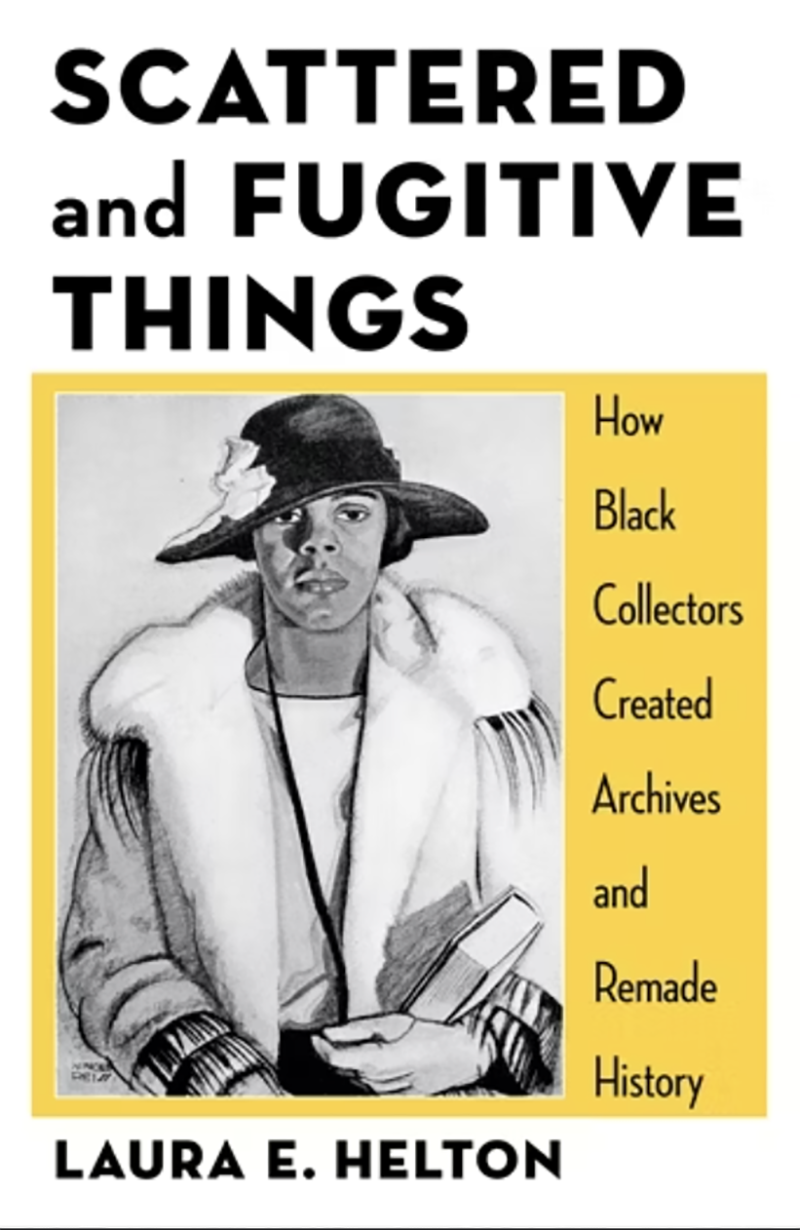 During the first half of the twentieth century, a group of collectors and creators dedicated themselves to documenting the history of African American life. At a time when dominant institutions cast doubt on the value or even the idea of Black history, these bibliophiles, scrapbookers, and librarians created an enduring set of African diasporic archives. In building these institutions and amassing abundant archival material, they also reshaped Black public culture, animating inquiry into the nature and meaning of Black history.
During the first half of the twentieth century, a group of collectors and creators dedicated themselves to documenting the history of African American life. At a time when dominant institutions cast doubt on the value or even the idea of Black history, these bibliophiles, scrapbookers, and librarians created an enduring set of African diasporic archives. In building these institutions and amassing abundant archival material, they also reshaped Black public culture, animating inquiry into the nature and meaning of Black history.
"Scattered and Fugitive Things" tells the stories of these Black collectors, traveling from the parlors of the urban north to HBCU reading rooms and branch libraries in the Jim Crow south. Laura E. Helton chronicles the work of six key figures: bibliophile Arturo Schomburg, scrapbook maker Alexander Gumby, librarians Virginia Lee and Vivian Harsh, curator Dorothy Porter, and historian L. D. Reddick. Drawing on overlooked sources such as book lists and card catalogs, she reveals the risks collectors took to create Black archives. This book also explores the social life of collecting, highlighting the communities that used these collections from the South Side of Chicago to Roanoke, Virginia. In each case, Helton argues, archiving was alive in the present, a site of intellectual experiment, creative abundance, and political possibility. Offering new ways to understand Black intellectual and literary history, "Scattered and Fugitive Things" reveals Black collecting as a radical critical tradition that reimagines past, present, and future. - Publisher's Description
Request this Title
The Sisterhood: How a Network of Black Women Writers Changed American Culture
Thorsson, Courtney (2023)
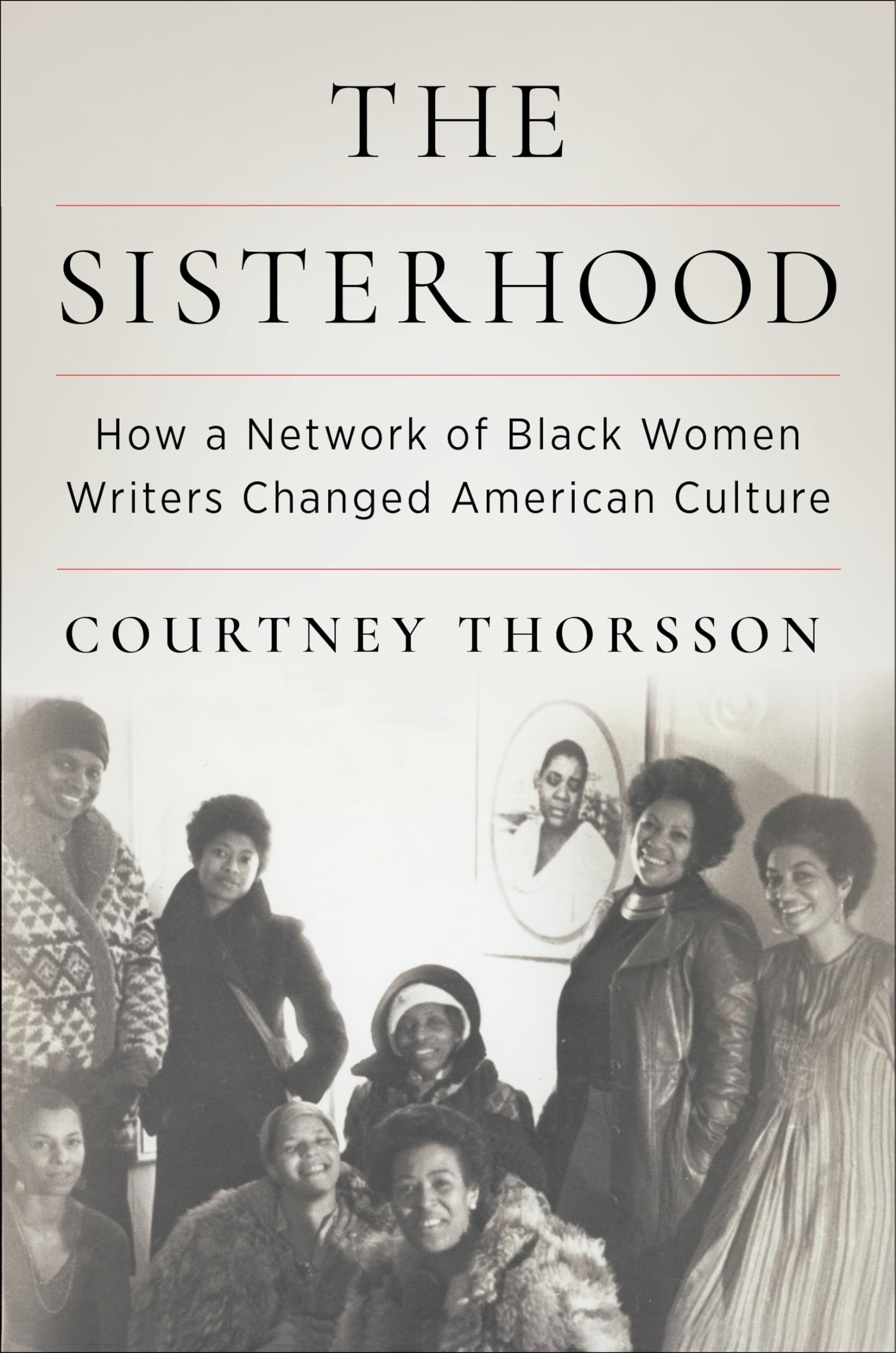 One Sunday afternoon in February 1977, Toni Morrison, Alice Walker, Ntozake Shange, and several other Black women writers met at June Jordan’s Brooklyn apartment to eat gumbo, drink champagne, and talk about their work. Calling themselves “The Sisterhood,” the group—which also came to include Audre Lorde, Paule Marshall, Margo Jefferson, and others—would get together once a month over the next two years, creating a vital space for Black women to discuss literature and liberation.
One Sunday afternoon in February 1977, Toni Morrison, Alice Walker, Ntozake Shange, and several other Black women writers met at June Jordan’s Brooklyn apartment to eat gumbo, drink champagne, and talk about their work. Calling themselves “The Sisterhood,” the group—which also came to include Audre Lorde, Paule Marshall, Margo Jefferson, and others—would get together once a month over the next two years, creating a vital space for Black women to discuss literature and liberation.
"The Sisterhood" tells the story of how this remarkable community transformed American writing and cultural institutions. Drawing on original interviews with Sisterhood members as well as correspondence, meeting minutes, and readings of their works, Courtney Thorsson explores the group’s everyday collaboration and profound legacy. The Sisterhood advocated for Black women writers at trade publishers and magazines such as Random House, Ms., and Essence, and eventually in academic departments as well—often in the face of sexist, racist, and homophobic backlash. Thorsson traces the personal, professional, and political ties that brought the group together as well as the reasons for its dissolution. She considers the popular and critical success of Sisterhood members in the 1980s, the uneasy absorption of Black feminism into the academy, and how younger writers built on the foundations the group laid. Highlighting the organizing, networking, and community building that nurtured Black women’s writing, this book demonstrates that The Sisterhood offers an enduring model for Black feminist collaboration. - Publisher's Description
Request this Title
An Introduction to Black Studies
Jackson, Eric R. (2023)
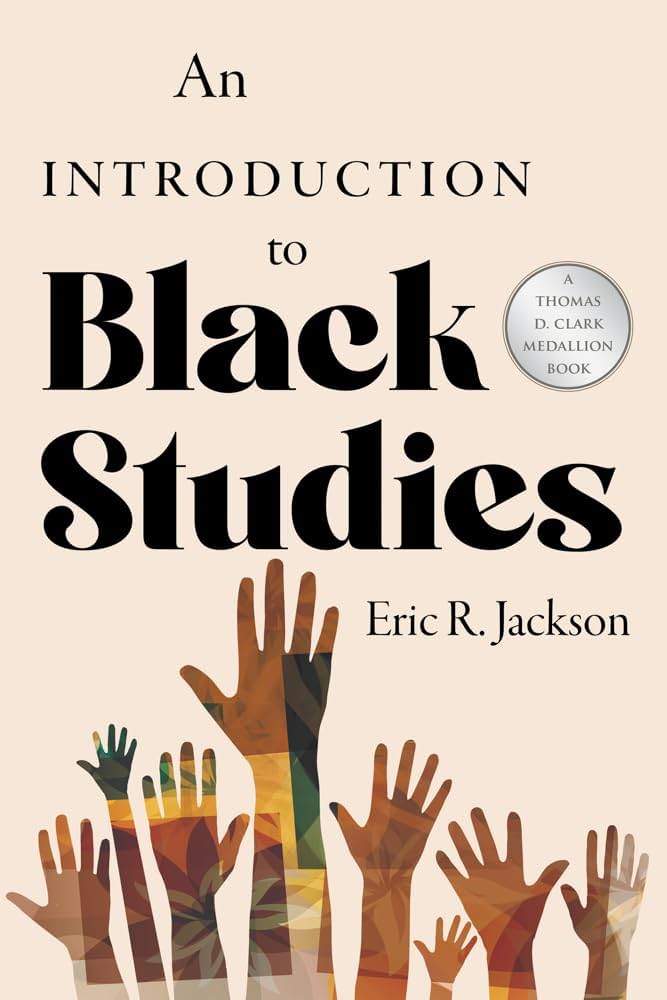 For hundreds of years, the American public education system has neglected to fully examine, discuss, and acknowledge the vast and rich history of people of African descent who have played a pivotal role in the transformation of the United States. The establishment of Black studies departments and programs represented a major victory for higher education and a vindication of Black scholars such as W. E. B. Du Bois and Nathan Huggins. This emerging field of study sought to address omissions from numerous disciplines and correct the myriad distortions, stereotypes, and myths about persons of African descent.
For hundreds of years, the American public education system has neglected to fully examine, discuss, and acknowledge the vast and rich history of people of African descent who have played a pivotal role in the transformation of the United States. The establishment of Black studies departments and programs represented a major victory for higher education and a vindication of Black scholars such as W. E. B. Du Bois and Nathan Huggins. This emerging field of study sought to address omissions from numerous disciplines and correct the myriad distortions, stereotypes, and myths about persons of African descent.
In "An Introduction to Black Studies," Eric R. Jackson demonstrates the continuing need for Black studies, also known as African American studies, in university curricula. Jackson connects the growth and impact of Black studies to the broader context of social justice movements, emphasizing the historical and contemporary demand for the discipline. This book features seventeen chapters that focus on the primary eight disciplines of Black studies: history, sociology, psychology, religion, feminism, education, political science, and the arts. Each chapter includes a biographical vignette of an important figure in African American history, such as Frederick Douglass, Louis Armstrong, and Madam C. J. Walker, as well as student learning objectives that provide a starting point for educators. This valuable work speaks to the strength and rigor of scholarship on Blacks and African Americans, its importance to the formal educational process, and its relevance to the United States and the world. - Publisher's Description
Request this Title
Her Truth and Service: Lucy Diggs Slowe in Her Own Words
Slowe, Lucy Diggs; Yeboah Quarkume, Amy (2024)
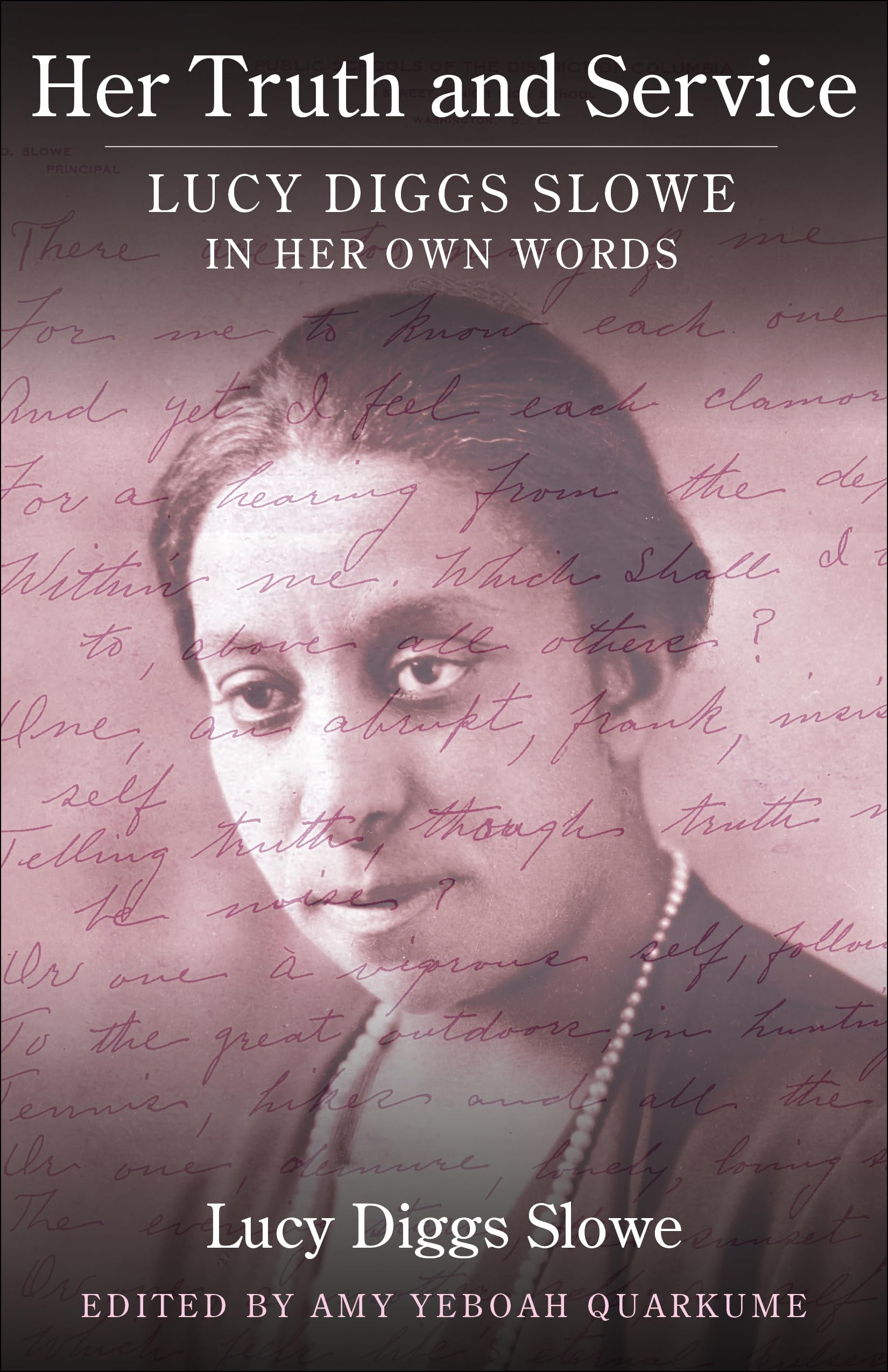 Lucy Diggs Slowe (1885–1937) was one of the most remarkable and accomplished figures in the history of Black women’s higher education. She was a builder of institutions, organizing the first historically Black sorority, Alpha Kappa Alpha, while a student at Howard University in 1908; establishing the first junior high school for Black students in Washington, D.C.; and founding as well as leading other major national and community organizations. In 1922 Slowe was appointed the first Dean of Women at Howard, making her the first Black woman to serve as dean at any American university. Beyond her trailblazing career in higher education, she was a committed teacher, an ardent antiracist advocate, and even a national tennis champion.
Lucy Diggs Slowe (1885–1937) was one of the most remarkable and accomplished figures in the history of Black women’s higher education. She was a builder of institutions, organizing the first historically Black sorority, Alpha Kappa Alpha, while a student at Howard University in 1908; establishing the first junior high school for Black students in Washington, D.C.; and founding as well as leading other major national and community organizations. In 1922 Slowe was appointed the first Dean of Women at Howard, making her the first Black woman to serve as dean at any American university. Beyond her trailblazing career in higher education, she was a committed teacher, an ardent antiracist advocate, and even a national tennis champion.
"Her Truth and Service" showcases Slowe’s speeches, articles, and letters, illuminating her multifaceted accomplishments and unwavering dedication to the quest for equality and justice. In these texts, readers encounter Slowe’s powerful voice and keen intellect, witnessing her triumphs and travails as an educator, a leader, and a Black woman in a deeply exclusionary society. Slowe’s writings depict her personal and professional efforts to topple race and gender barriers and open up greater opportunities for Black women and girls, as well as the obstacles she faced in male-dominated institutions including the Howard administration. "Her Truth and Service" is an important document of a significant figure in the development of Black institutions and an inspiring testament to the lifelong struggle for social justice. - Publisher's Description
Request this Title
Building the Black City: the Transformation of American Life
Trotter, Joe William (2024)
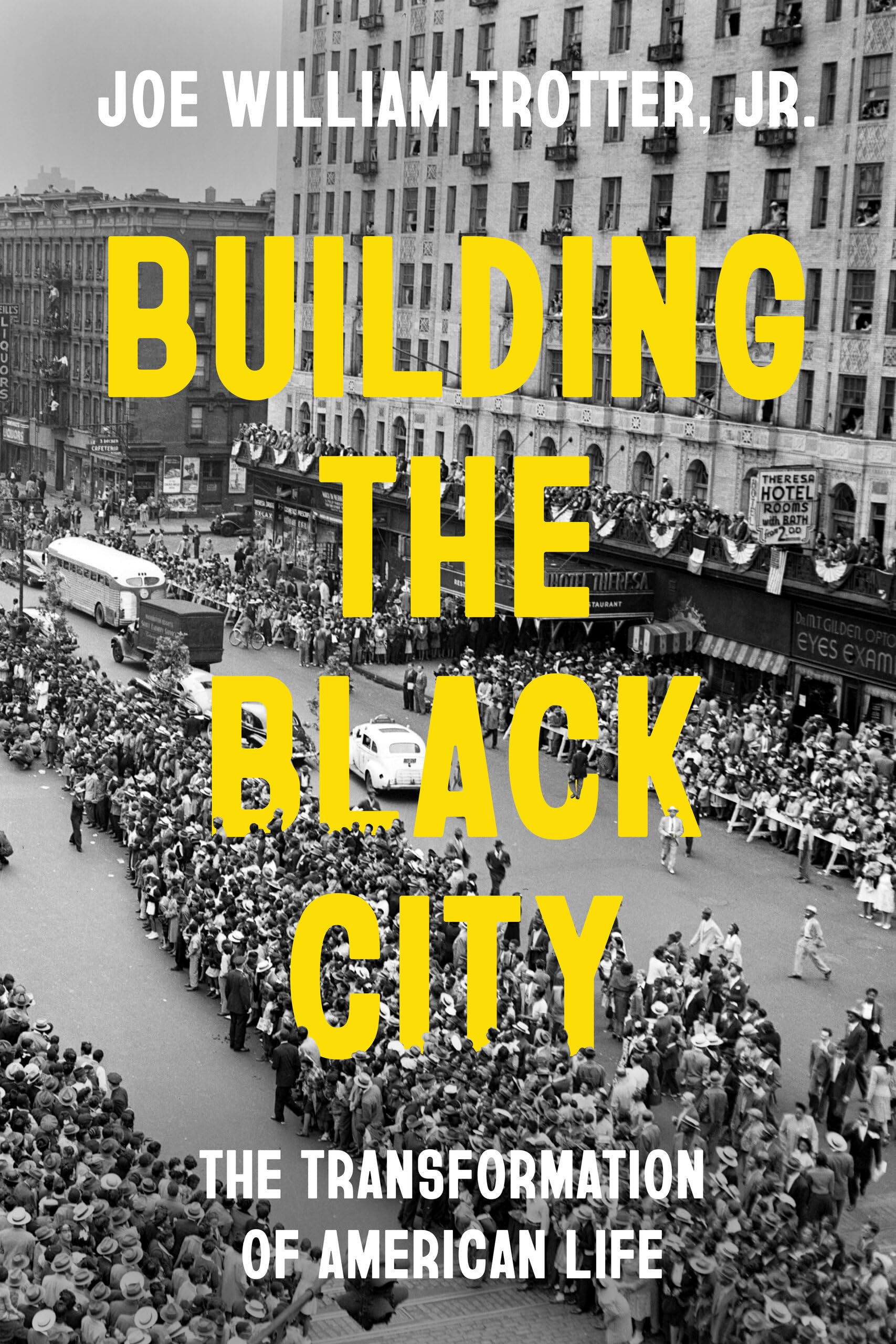 "Building the Black City" shows how African Americans built and rebuilt thriving cities for themselves, even as their unpaid and underpaid labor enriched the nation's economic, political, and cultural elites. Covering an incredible range of cities from the North to the South, the East to the West, Joe William Trotter, Jr., traces the growth of Black cities and political power from the preindustrial era to the present.
"Building the Black City" shows how African Americans built and rebuilt thriving cities for themselves, even as their unpaid and underpaid labor enriched the nation's economic, political, and cultural elites. Covering an incredible range of cities from the North to the South, the East to the West, Joe William Trotter, Jr., traces the growth of Black cities and political power from the preindustrial era to the present.
Trotter defines the Black city as a complicated socioeconomic, spiritual, political, and spatial process, unfolding time and again as Black communities carved out urban space against the violent backdrop of recurring assaults on their civil and human rights—including the right to the city. As we illuminate the destructive depths of racial capitalism and how Black people have shaped American culture, politics, and democracy, "Building the Black City" reminds us that the case for reparations must also include a profound appreciation for the creativity and productivity of African Americans on their own behalf. - Publisher's Description
Request this Title
The Black Tax: 150 Years of Theft, Exploitation, and Dispossession in America
Kahrl, Andrew W. (2024)
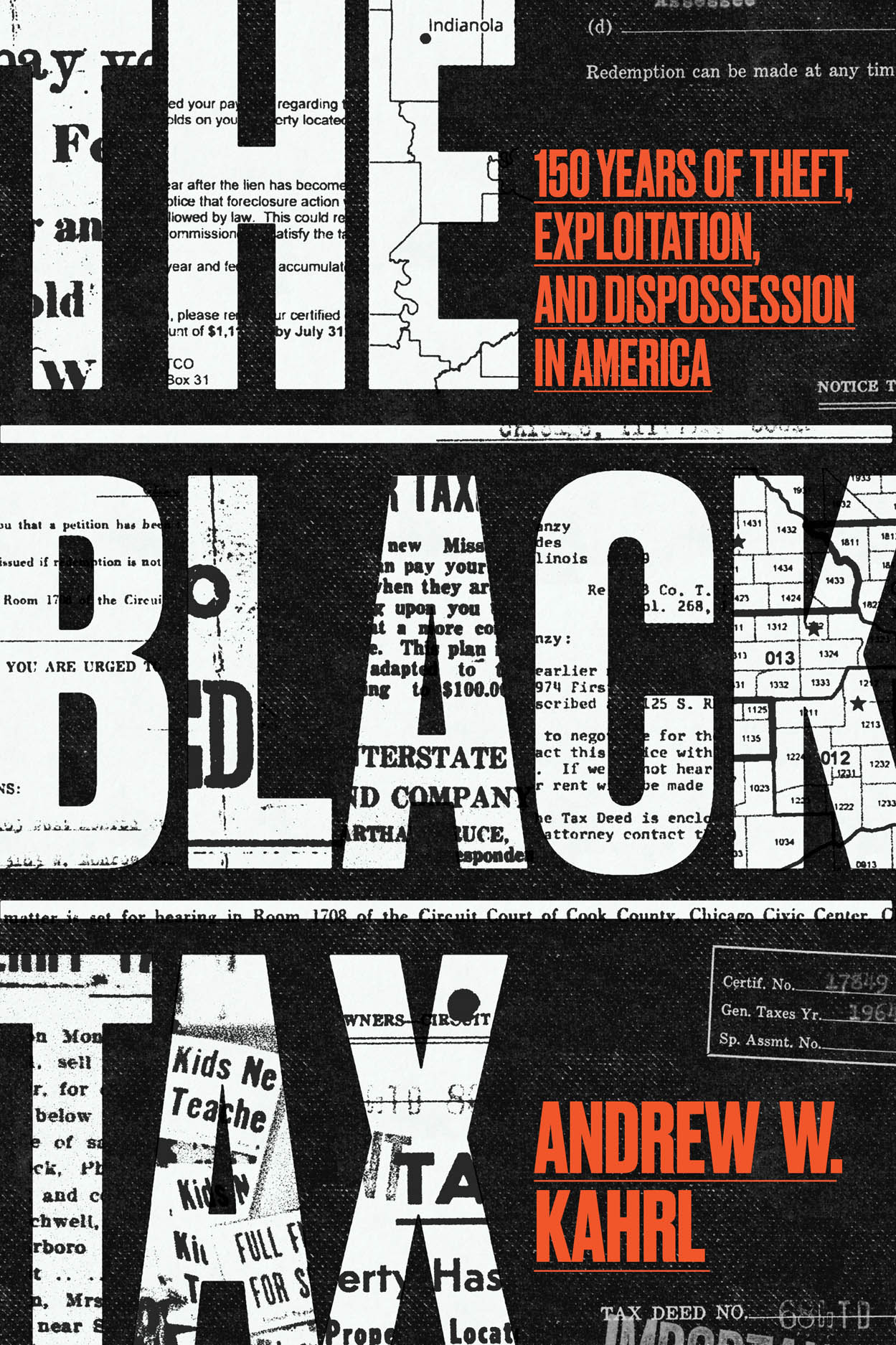 American taxation is unfair, and it is most unfair to the very people who critically need its support. Not only do taxpayers with fewer resources—less wealth, power, and land—pay more than the well-off, but they are forced to fight for their rights within an unjust system that undermines any attempts to improve their position or economic standing. In "The Black Tax," Andrew W. Kahrl reveals the shocking history and ruinous consequences of inequitable and predatory tax laws in this country—above all, widespread and devastating racial dispossession.
American taxation is unfair, and it is most unfair to the very people who critically need its support. Not only do taxpayers with fewer resources—less wealth, power, and land—pay more than the well-off, but they are forced to fight for their rights within an unjust system that undermines any attempts to improve their position or economic standing. In "The Black Tax," Andrew W. Kahrl reveals the shocking history and ruinous consequences of inequitable and predatory tax laws in this country—above all, widespread and devastating racial dispossession.
Throughout the twentieth century, African Americans acquired substantial amounts of property nationwide. But racist practices, obscure processes, and outright theft diminished their holdings and their power. Of these, Kahrl shows, few were more powerful, or more quietly destructive, than property taxes. He examines all the structural features and hidden traps within America’s tax system that have forced Black Americans to pay more for less and stripped them of their land and investments, and he reveals the staggering cost. The story of America’s now enormous concentration of wealth at the top—and the equally enormous absence of wealth among most Black households—has its roots here.
Kahrl exposes the painful history of these practices, from Reconstruction up to the present, and tells, for the first time, the story of Black Americans’ experiences as taxpayers and their fight for a more fair and equitable system for raising and spending the public’s money. This is a history that deepens our understanding of the disadvantages and persistent inequalities that African American households continue to face and reveals hidden engines of economic inequality in America. Detailing the hows and whys of America’s profoundly unequal tax system, "The Black Tax" equips readers with the knowledge needed to combat inequality and injustice today. - Publisher's Description
Request this Title
Blacksound: Making Race and Popular Music in the United States
Morrison, Matthew D. (2024)
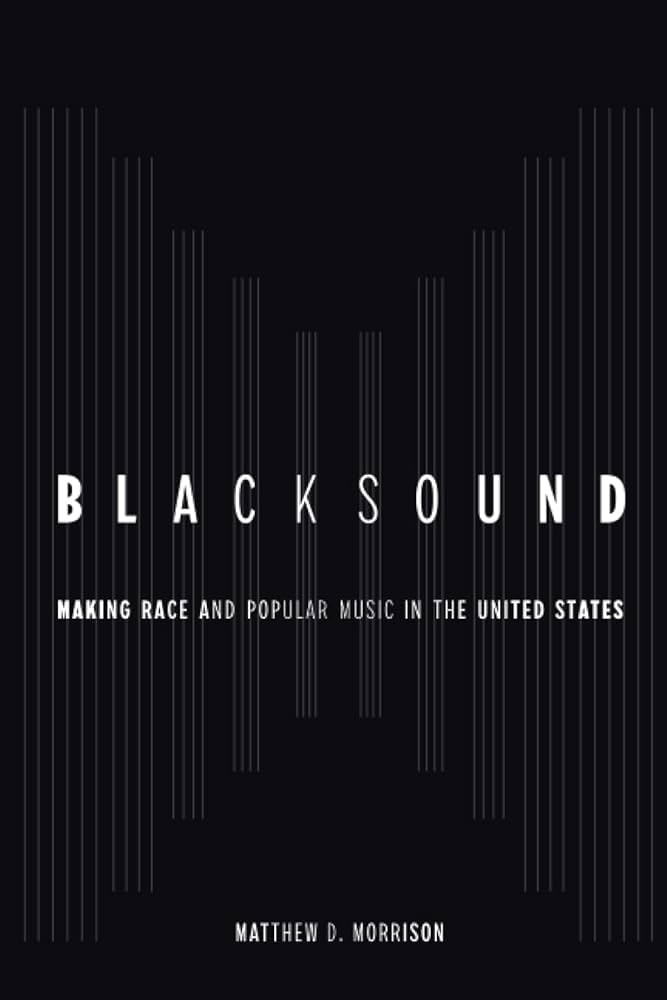 "Blacksound" explores the sonic history of blackface minstrelsy and the racial foundations of American musical culture from the early 1800s through the turn of the twentieth century. With this namesake book, Matthew D. Morrison develops the concept of "Blacksound" to uncover how the popular music industry and popular entertainment in general in the United States arose out of slavery and blackface.
"Blacksound" explores the sonic history of blackface minstrelsy and the racial foundations of American musical culture from the early 1800s through the turn of the twentieth century. With this namesake book, Matthew D. Morrison develops the concept of "Blacksound" to uncover how the popular music industry and popular entertainment in general in the United States arose out of slavery and blackface.
"Blacksound" as an idea is not the music or sounds produced by Black Americans but instead the material and fleeting remnants of their sounds and performances that have been co-opted and amalgamated into popular music. Morrison unpacks the relationship between performance, racial identity, and intellectual property to reveal how blackface minstrelsy scripts became absorbed into commercial entertainment through an unequal system of intellectual property and copyright laws. By introducing this foundational new concept in musicology, "Blacksound" highlights what is politically at stake—for creators and audiences alike—in revisiting the long history of American popular music. - Publisher's Description
Request this Title
Shirley Chisholm in Her Own Words: Speeches and Writings
Fraser, Zinga A. (2024)
 In the midst of her groundbreaking twenty-year career in the U.S. House of Representatives, Congresswoman Shirley Chisholm once declared, "Everyone—with the exception of the black woman herself—has been interpreting the black woman." Edited by Zinga A. Fraser, the leading scholar dedicated to the study of Chisholm's legacy, "Shirley Chisholm in Her Own Words" gives readers a rare opportunity to engage with the congresswoman's powerful ideas in her own voice.
In the midst of her groundbreaking twenty-year career in the U.S. House of Representatives, Congresswoman Shirley Chisholm once declared, "Everyone—with the exception of the black woman herself—has been interpreting the black woman." Edited by Zinga A. Fraser, the leading scholar dedicated to the study of Chisholm's legacy, "Shirley Chisholm in Her Own Words" gives readers a rare opportunity to engage with the congresswoman's powerful ideas in her own voice.
Many Americans are familiar with Chisholm's importance as the first Black woman in Congress and the first woman and African American to run for president with either major party. This long-overdue treatment of her work establishes Chisholm as an unparalleled public intellectual and Black feminist both in her time and now. The book not only contextualizes the Civil Rights and Black Power era; it also provides timeless insights on issues that are exceedingly relevant in our current moment. Featuring a captivating introduction by Fraser, "Shirley Chisholm in Her Own Words" introduces a new generation to one of the most impactful proponents of democracy in America. - Publisher's Description
Request this Title
An Anthology of Blackness: The State of Black Design
Moses, Terresa; Souza, Omari (2023)
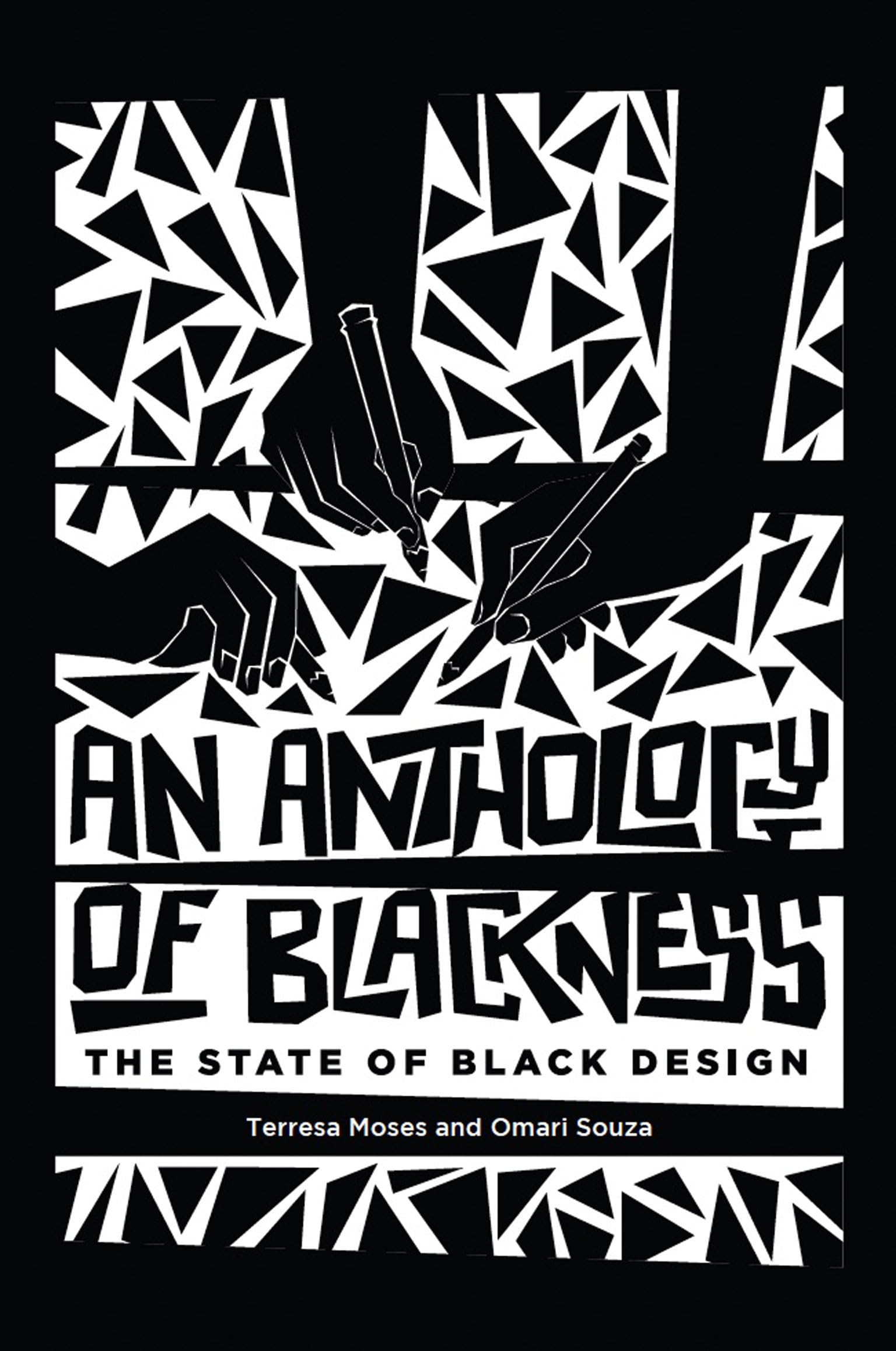 "An Anthology of Blackness" examines the intersection of Black identity and practice, probing why the design field has failed to attract Black professionals, how Eurocentric hegemony impacts Black professionals, and how Black designers can create an anti-racist design industry. Contributing authors and creators demonstrate how to develop a pro-Black design practice of inclusivity, including Black representation in designed media, anti-racist pedagogy, and radical self-care. Through autoethnography, lived experience, scholarship, and applied research, these contributors share proven methods for creating an anti-racist and inclusive design practice.
"An Anthology of Blackness" examines the intersection of Black identity and practice, probing why the design field has failed to attract Black professionals, how Eurocentric hegemony impacts Black professionals, and how Black designers can create an anti-racist design industry. Contributing authors and creators demonstrate how to develop a pro-Black design practice of inclusivity, including Black representation in designed media, anti-racist pedagogy, and radical self-care. Through autoethnography, lived experience, scholarship, and applied research, these contributors share proven methods for creating an anti-racist and inclusive design practice.
The contributions in "An Anthology of Blackness" include essays, opinion pieces, case studies, and visual narratives. Many contributors write from an intersectional perspective on race, gender, sexuality, ethnicity, and ability. Each section of the book expands on community-driven concerns about the state of the design industry, design pedagogy, and design activism. Ultimately, this articulated intersection of Black identity and Black design practice reveals the power of resistance, community, and solidarity—and the hope for a more equitable future. With a foreword written by design luminary Elizabeth (Dori) Tunstall, An Anthology of Blackness is a pioneering contribution to the literature of social justice. - Publisher's Description
Request this Title
Blackward
Lindell, Lawrence (2023)
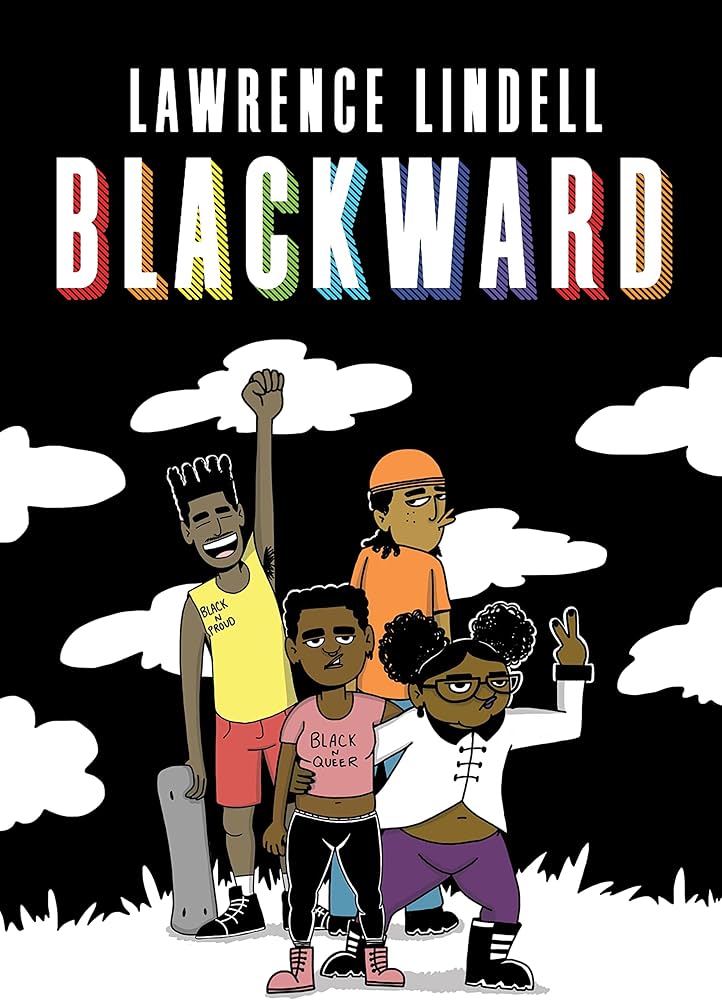 Tired of feeling like you don’t belong? Join the club. It’s called the Section. You’d think a spot to chill, chat, and find community would be much easier to come by for nerdy, queer punks. But when four longtime, bookish BFFs―Lika, Amor, Lala, and Tony―can’t find what they need, they take matters into their own hands and create a space where they can be a hundred percent who they are: Black, queer, and weird. The group puts a call out for all awkward Black folks to come on down to the community center to connect. But low attendance and IRL run-ins with trolls of all kinds only rock everybody with anxiety. As our protagonists start to question the merits of their vision, a lifetime of insecurities―about not being good enough or Black enough―bubbles to the surface. Will they find a way to turn it around in time for their radical brainchild, the Blackward Zine Fest?
Tired of feeling like you don’t belong? Join the club. It’s called the Section. You’d think a spot to chill, chat, and find community would be much easier to come by for nerdy, queer punks. But when four longtime, bookish BFFs―Lika, Amor, Lala, and Tony―can’t find what they need, they take matters into their own hands and create a space where they can be a hundred percent who they are: Black, queer, and weird. The group puts a call out for all awkward Black folks to come on down to the community center to connect. But low attendance and IRL run-ins with trolls of all kinds only rock everybody with anxiety. As our protagonists start to question the merits of their vision, a lifetime of insecurities―about not being good enough or Black enough―bubbles to the surface. Will they find a way to turn it around in time for their radical brainchild, the Blackward Zine Fest?
Lawrence Lindell’s characters pop from the page in playful Technicolor. From mental health to romance, micro―and macro―aggressions to joy, our crew tackles everything life throws at them in this heartwarming tale about building a place to belong and the power of community. - Publisher's Description
Request this Title
Union Divided: Black Musicians' Fight for Labor Equality
Miller, Leta (2024)
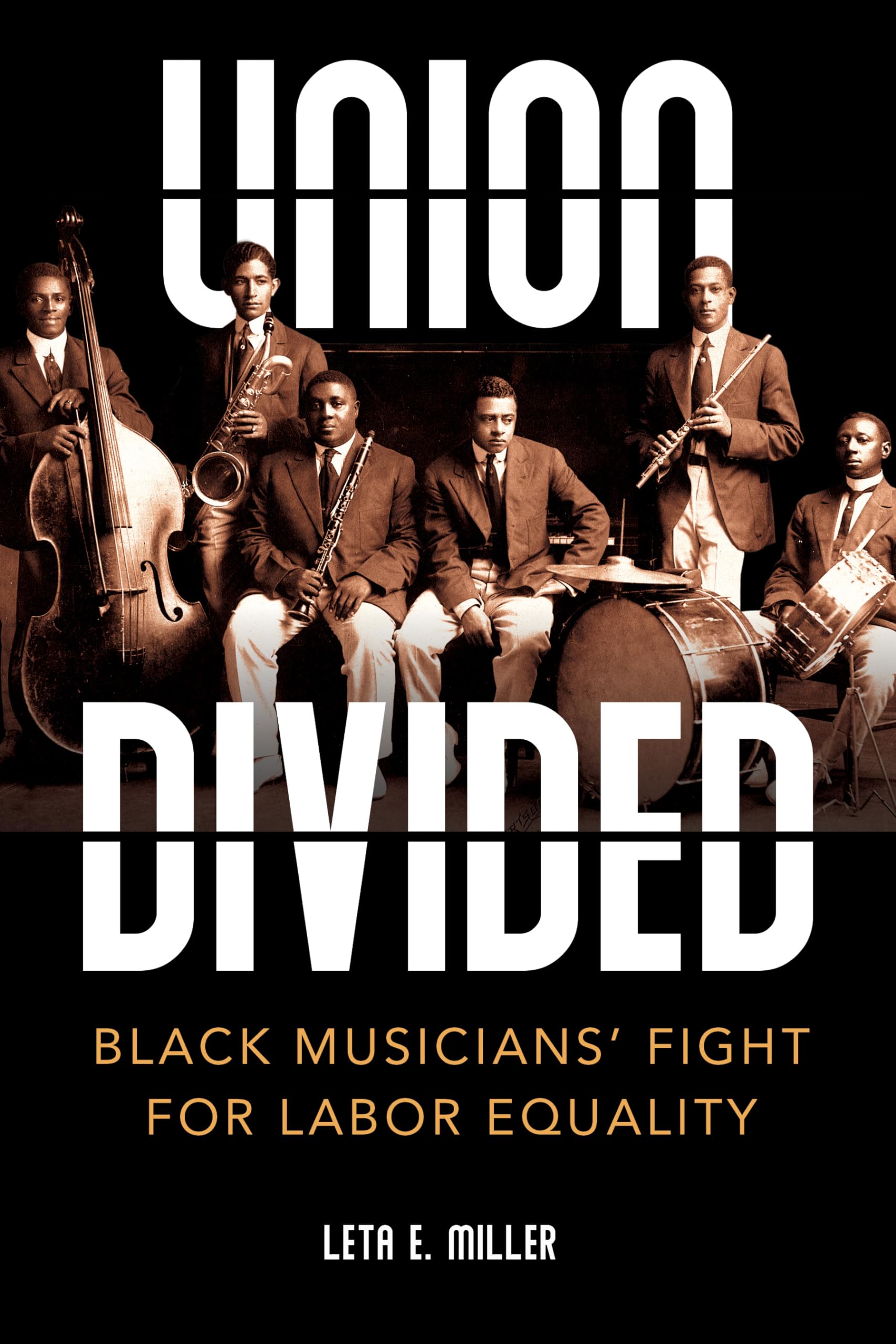 In the 1910s and 1920s, Black musicians organized more than fifty independent locals within the American Federation of Musicians (AFM) in an attempt to control audition criteria, set competitive wages, and secure a voice in national decision-making. Leta Miller follows the AFM’s history of Black locals, which competed directly with white locals in the same territories, from their origins and successes in the 1920s through Depression-era crises to the fraught process of dismantling segregated AFM organizations in the 1960s and 70s. Like any union, Black AFM locals sought to ensure employment and competitive wages for members with always-evolving solutions to problems. Miller’s account of these efforts includes the voices of the musicians themselves and interviews with former union members who took part in the difficult integration of Black and white locals. She also analyzes the fundamental question of how musicians benefitted from membership in a labor organization.
In the 1910s and 1920s, Black musicians organized more than fifty independent locals within the American Federation of Musicians (AFM) in an attempt to control audition criteria, set competitive wages, and secure a voice in national decision-making. Leta Miller follows the AFM’s history of Black locals, which competed directly with white locals in the same territories, from their origins and successes in the 1920s through Depression-era crises to the fraught process of dismantling segregated AFM organizations in the 1960s and 70s. Like any union, Black AFM locals sought to ensure employment and competitive wages for members with always-evolving solutions to problems. Miller’s account of these efforts includes the voices of the musicians themselves and interviews with former union members who took part in the difficult integration of Black and white locals. She also analyzes the fundamental question of how musicians benefitted from membership in a labor organization.
Broad in scope and rich in detail, "Union Divided" illuminates the complex working world of unionized Black musicians and the AFM’s journey to racial inclusion. - Publisher's Description
Request this Title
Insatiable City: Food & Race in New Orleans
McCulla, Theresa (2024)
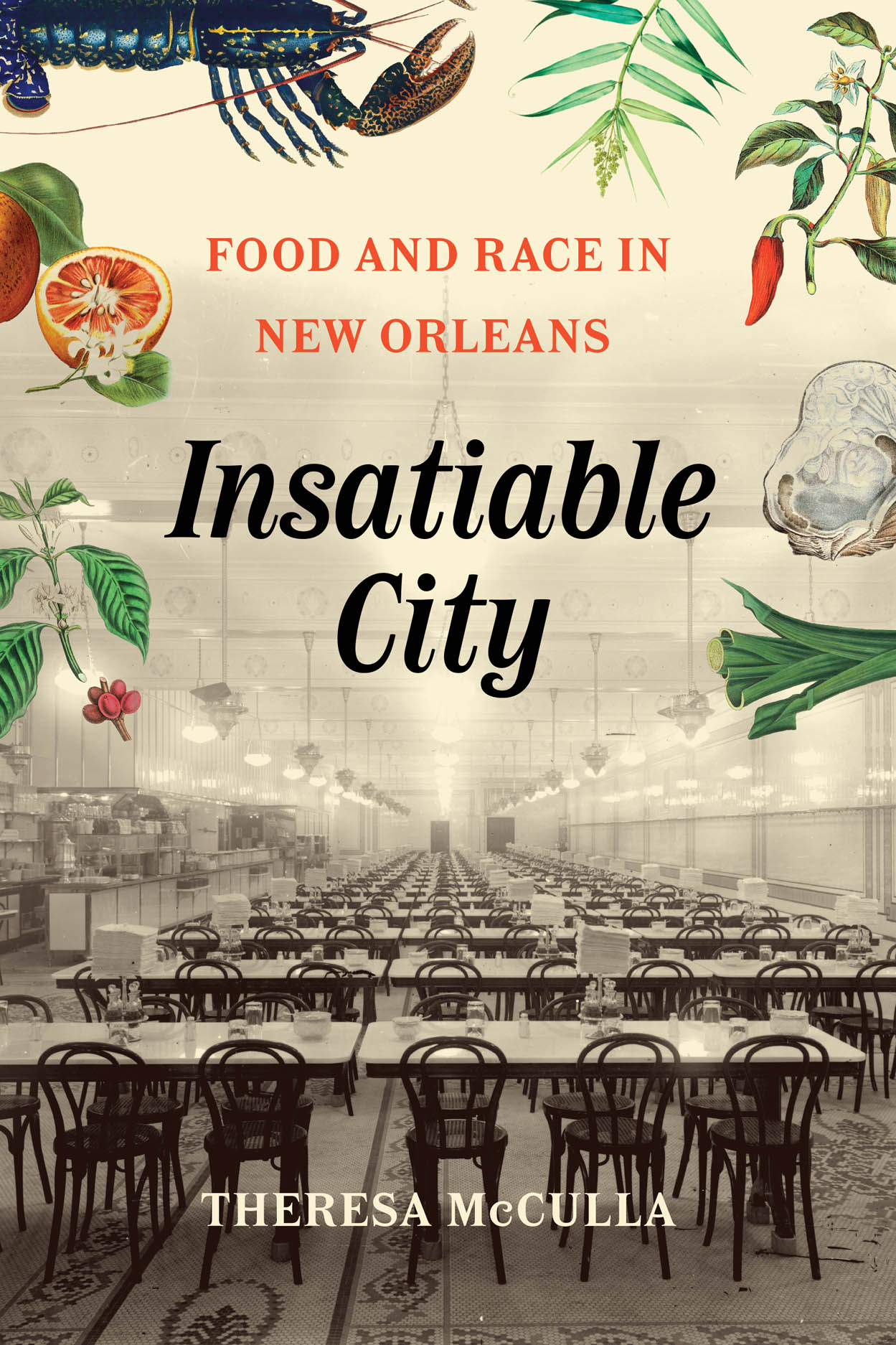 In "Insatiable City," Theresa McCulla probes the overt and covert ways that the production of food and the discourse about it both created and reinforced many strains of inequality in New Orleans, a city significantly defined by its foodways.
In "Insatiable City," Theresa McCulla probes the overt and covert ways that the production of food and the discourse about it both created and reinforced many strains of inequality in New Orleans, a city significantly defined by its foodways.
Tracking the city’s economy from nineteenth-century chattel slavery to twentieth-century tourism, McCulla uses menus, cookbooks, newspapers, postcards, photography, and other material culture to limn the interplay among the production and reception of food, the inscription and reiteration of racial hierarchies, and the constant diminishment and exploitation of working-class people. The consumption of food and people, she shows, was mutually reinforced and deeply intertwined. Yet she also details how enslaved and free people of color in New Orleans used food and drink to carve paths of mobility, stability, autonomy, freedom, profit, and joy. A story of pain and pleasure, labor and leisure, "Insatiable City" goes far beyond the task of tracing New Orleans’s culinary history to focus on how food suffuses culture and our understandings and constructions of race and power. - Publisher's Description
Request this Title
An Unholy Traffic: Slave Trading in the Civil War South
Colby, Robert K.D. (2024)
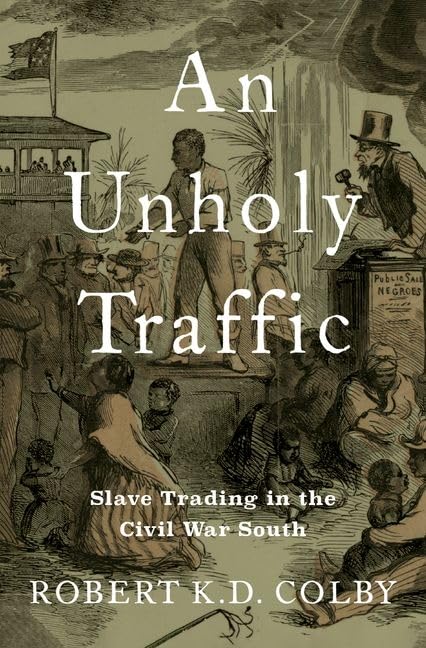 The Confederate States of America was born in defense of slavery and, after a four-year struggle to become an independent slaveholding republic, died as emancipation dawned. Between Fort Sumter to Appomattox, Confederates bought and sold thousands African American men, women, and children. These transactions in humanity made the internal slave trade a cornerstone of Confederate society, a bulwark of the Rebel economy, and a central part of the experience of the Civil War for all inhabiting the American South.
The Confederate States of America was born in defense of slavery and, after a four-year struggle to become an independent slaveholding republic, died as emancipation dawned. Between Fort Sumter to Appomattox, Confederates bought and sold thousands African American men, women, and children. These transactions in humanity made the internal slave trade a cornerstone of Confederate society, a bulwark of the Rebel economy, and a central part of the experience of the Civil War for all inhabiting the American South.
As "An Unholy Traffic" shows, slave trading helped Southerners survive and fight the Civil War, as well as to build the future for which they fought. They mitigated the crises the war spawned by buying and selling enslaved people, using this commerce to navigate food shortages, unsettled gender roles, the demands of military service, and other hardships on the homefront. Some Rebels speculated wildly in human property, investing in slaves to ward off inflation and to buy shares in the slaveholding nation they hoped to create. Others traded people to counter the advance of emancipation. Given its centrality to their nationhood, Confederates went to great lengths to prolong the slave trade, which, in turn, supported the Confederacy. For those held in slavery, the surviving slave trade dramatically shaped their pursuit of freedom, inserting a retrograde movement into some people's journeys toward liberty while inspiring others to make the risky decision to escape.
Offering an original perspective on the intersections of slavery, capitalism, the Civil War, and emancipation, Robert K.D. Colby illuminates the place of the peculiar institution within the Confederate mind, the ways in which it underpinned the CSA's war effort, and its impact on those attempting to seize their freedom. - Publisher's Description
Request this Title
Black Networked Resistance: Strategic Rearticulations in the Digital Age
Maragh-Lloyd, Raven (2024)
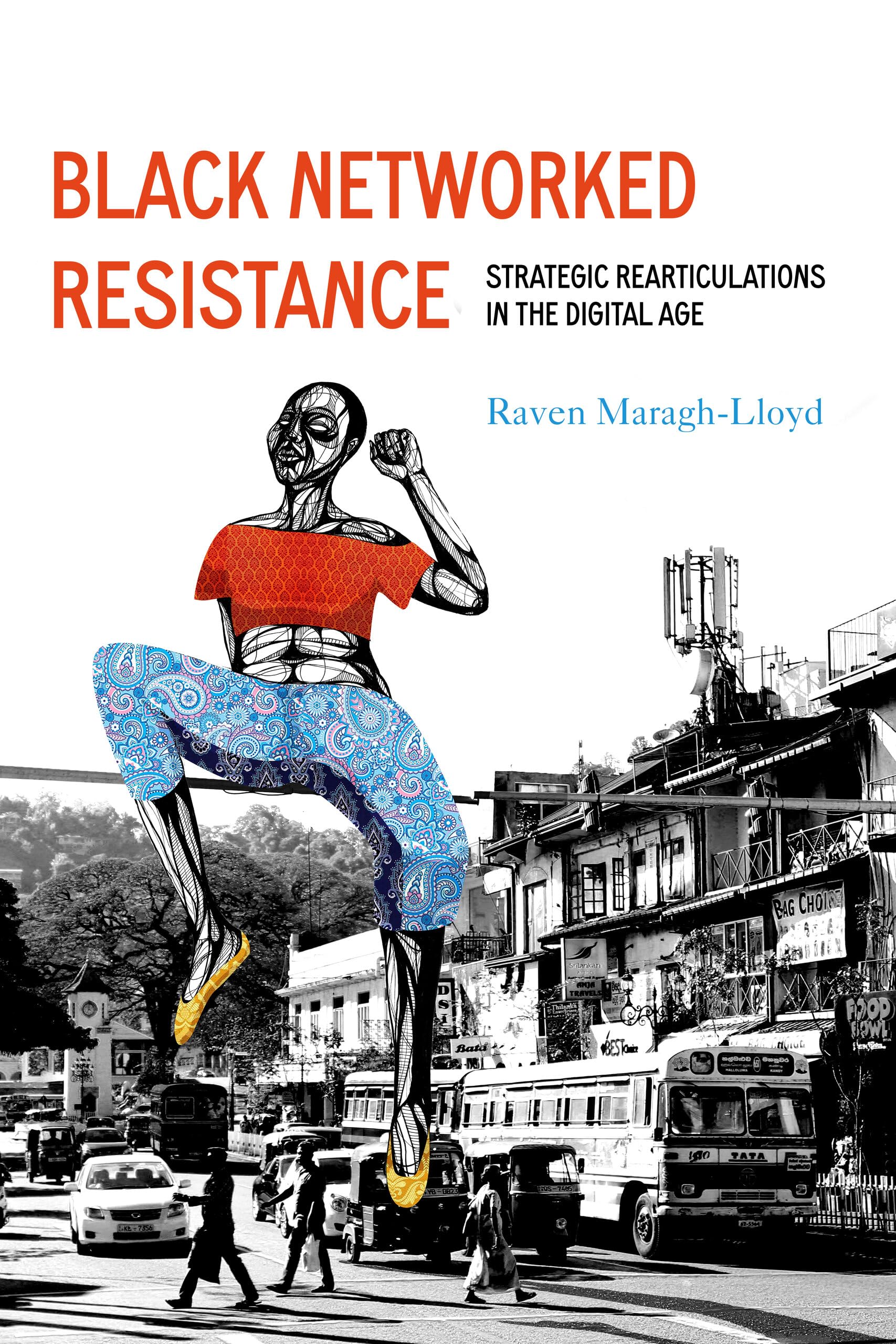 "Black Networked Resistance" explores the creative range of Black digital users and their responses to varying forms of oppression, utilizing cultural, communicative, political, and technological threads both on and offline.
"Black Networked Resistance" explores the creative range of Black digital users and their responses to varying forms of oppression, utilizing cultural, communicative, political, and technological threads both on and offline.
Raven Maragh-Lloyd demonstrates how Black users strategically rearticulate their responses to oppression in ways that highlight Black publics’ historically rich traditions and reveal the shifting nature of both dominance and resistance, particularly in the digital age. Through case studies and interviews, Maragh-Lloyd reveals the malleable ways resistance can take shape and the ways Black users artfully demonstrate such modifications of resistance through strategies of survival, reprieve, and community online. Each chapter grounds itself in a resistance strategy, such as Black humor, care, or archiving, to show the ways that Black publics reshape strategies of resistance over time and across media platforms. Linking singular digital resistance movements while arguing for Black publics as strategic content creators who connect resistance strategies from our past to suit our present needs, "Black Networked Resistance" encourages readers to create and cultivate lasting communities necessary for social and political change by imagining a future of joy, community, and agency through their digital media practices. - Publisher's Description
Request this Title
Struggle for the Street: Social Networks and the Struggle for Civil Rights in Pittsburgh
Klanderud, Jessica (2023)
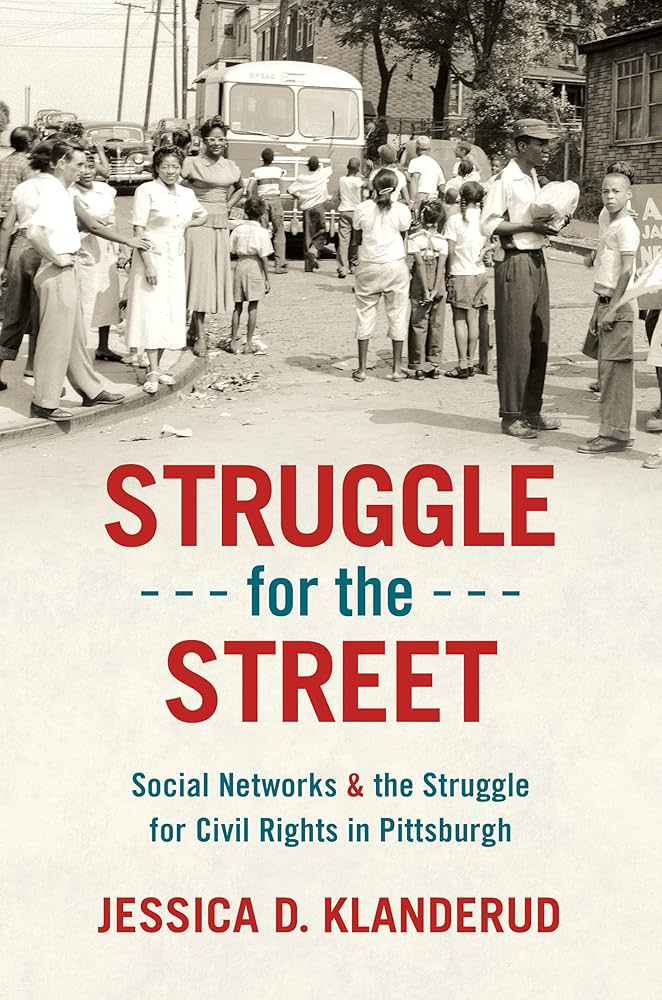 Cities are nothing without the streets—the arteries through which goods, people, and ideas flow. Neighborhood by neighborhood, block by block, the city streets are where politics begins. In "Struggle for the Street," Jessica D. Klanderud documents the development of class-based visions of political, social, and economic equality in Pittsburgh's African American community between World War I and the early 1970s. Klanderud emphasizes how middle-class and working-class African Americans struggled over the appropriate uses and dominant meanings of street spaces in their neighborhoods as they collectively struggled to define equality.
Cities are nothing without the streets—the arteries through which goods, people, and ideas flow. Neighborhood by neighborhood, block by block, the city streets are where politics begins. In "Struggle for the Street," Jessica D. Klanderud documents the development of class-based visions of political, social, and economic equality in Pittsburgh's African American community between World War I and the early 1970s. Klanderud emphasizes how middle-class and working-class African Americans struggled over the appropriate uses and dominant meanings of street spaces in their neighborhoods as they collectively struggled to define equality.
In chapters that move from one community to the next, Klanderud tracks the transformation of tactics over time with a streets-eye view that reveals the coalescing alliances between neighbors and through space. Drawing on oral histories of neighborhood residents, Black newspapers, and papers from the NAACP and Urban League, this study reveals complex class negotiations in the struggle for civil rights at the street level. - Publisher's Description
Request this Title
Jazz in the Hill: Nightlife & Narratives of a Pittsburgh Neighborhood
Harper, Colter (2024)
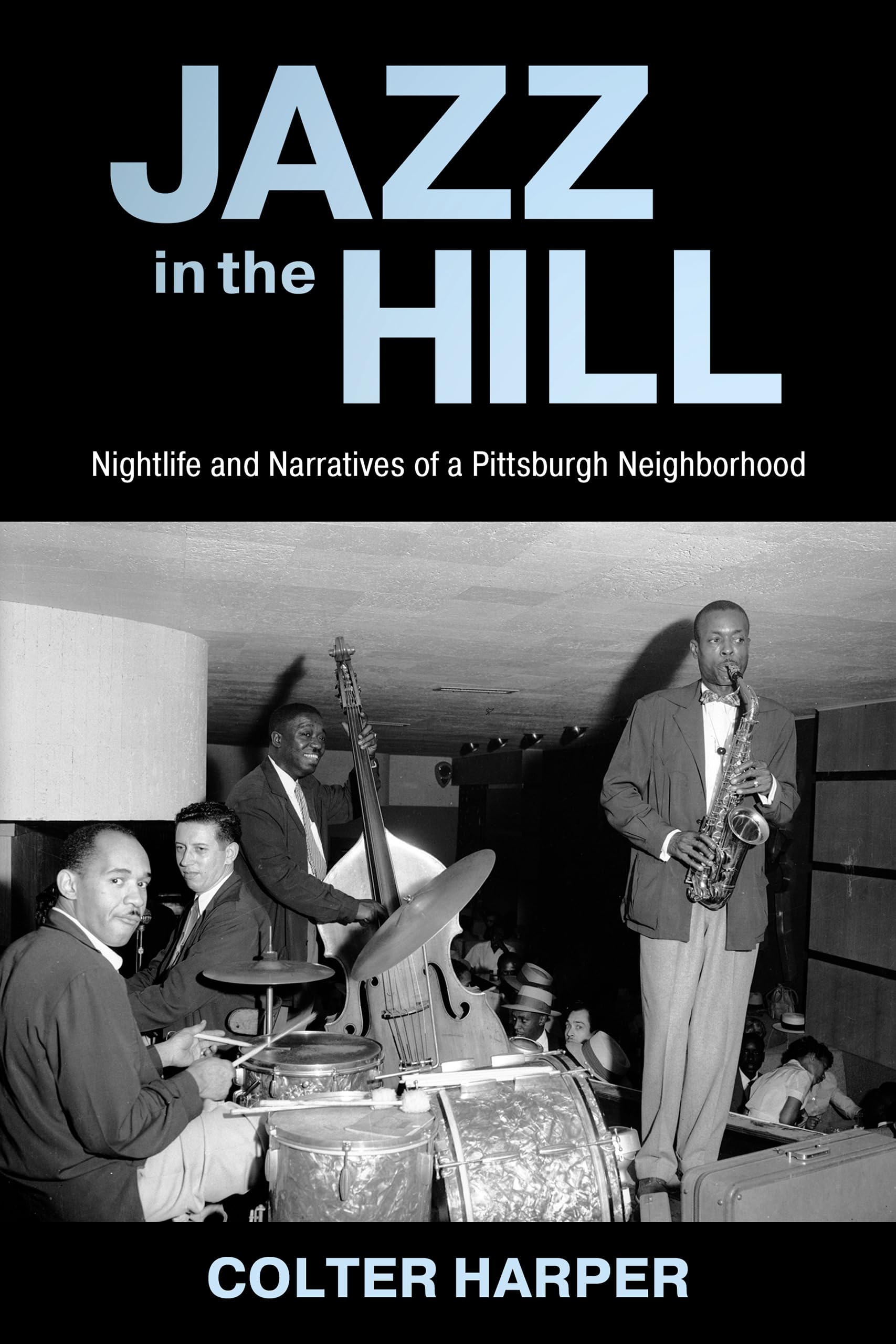 From the 1920s through the 1960s, Pittsburgh’s Hill District was the heart of the city’s Black cultural life and home to a vibrant jazz scene. In "Jazz in the Hill: Nightlife and Narratives of a Pittsburgh Neighborhood," Colter Harper looks at how jazz shaped the neighborhood and created a way of life. Beyond backdrops for remarkable careers, jazz clubs sparked the development of a self-determined African American community. In delving into the history of entrepreneurialism, placemaking, labor organizing, and critical listening in the Hill District, Harper forges connections to larger political contexts, processes of urban development, and civil rights struggles.
From the 1920s through the 1960s, Pittsburgh’s Hill District was the heart of the city’s Black cultural life and home to a vibrant jazz scene. In "Jazz in the Hill: Nightlife and Narratives of a Pittsburgh Neighborhood," Colter Harper looks at how jazz shaped the neighborhood and created a way of life. Beyond backdrops for remarkable careers, jazz clubs sparked the development of a self-determined African American community. In delving into the history of entrepreneurialism, placemaking, labor organizing, and critical listening in the Hill District, Harper forges connections to larger political contexts, processes of urban development, and civil rights struggles.
Harper adopts a broad approach in thinking about jazz clubs, foregrounding the network of patrons, business owners, and musicians who were actively invested in community building. Jazz in the Hill provides a valuable case study detailing the intersections of music, political and cultural history, public policy, labor, and law. The book addresses distinctive eras and issues of twentieth century American urban history, including notions of “vice” during the Prohibition Era (1920–1934); “blight” during the mid-twentieth century boom in urban redevelopment (1946–1973); and workplace integration during the civil rights era (1954–1968). Throughout, Harper demonstrates how the clubs, as a nexus of music, politics, economy, labor, and social relations, supported the livelihood of residents and artists while developing cultures of listening and learning. Though the neighborhood has undergone an extensive socioeconomic transformation that has muted its nightlife, this musical legacy continues to guide current development visions for the Hill on the cusp of its remaking. - Publisher's Description
Request this Title
Streaming Videos & Film
Malcolm X
Spike Lee (director); Starring Denzel Washington, Angela Bassett, Delroy Lindo (1992)
 Biograpical epic of Malcolm X, the legendary African American leader. Born Malcolm Little, his father (a Garveyite Baptist minister) was killed by Elijah Muhammad. Malcolm became a gangster, and while in jail discovered the Nation of Islam writings of Elijah Muhammad. He preaches the teachings when let out of jail, but later on goes on a pilgrimage to the city of Mecca, there he converts to the original Islamic religion and becomes a Sunni Muslim and changes his name to El-Hajj Malik Al-Shabazz. He is assassinated on February 21, 1965. - IMDB Synopsis
Biograpical epic of Malcolm X, the legendary African American leader. Born Malcolm Little, his father (a Garveyite Baptist minister) was killed by Elijah Muhammad. Malcolm became a gangster, and while in jail discovered the Nation of Islam writings of Elijah Muhammad. He preaches the teachings when let out of jail, but later on goes on a pilgrimage to the city of Mecca, there he converts to the original Islamic religion and becomes a Sunni Muslim and changes his name to El-Hajj Malik Al-Shabazz. He is assassinated on February 21, 1965. - IMDB Synopsis
Request this Title
I Am Not Your Negro
Raoul Peck (director); Starring Samuel L. Jackson, James Baldwin, Martin Luther King (2016)
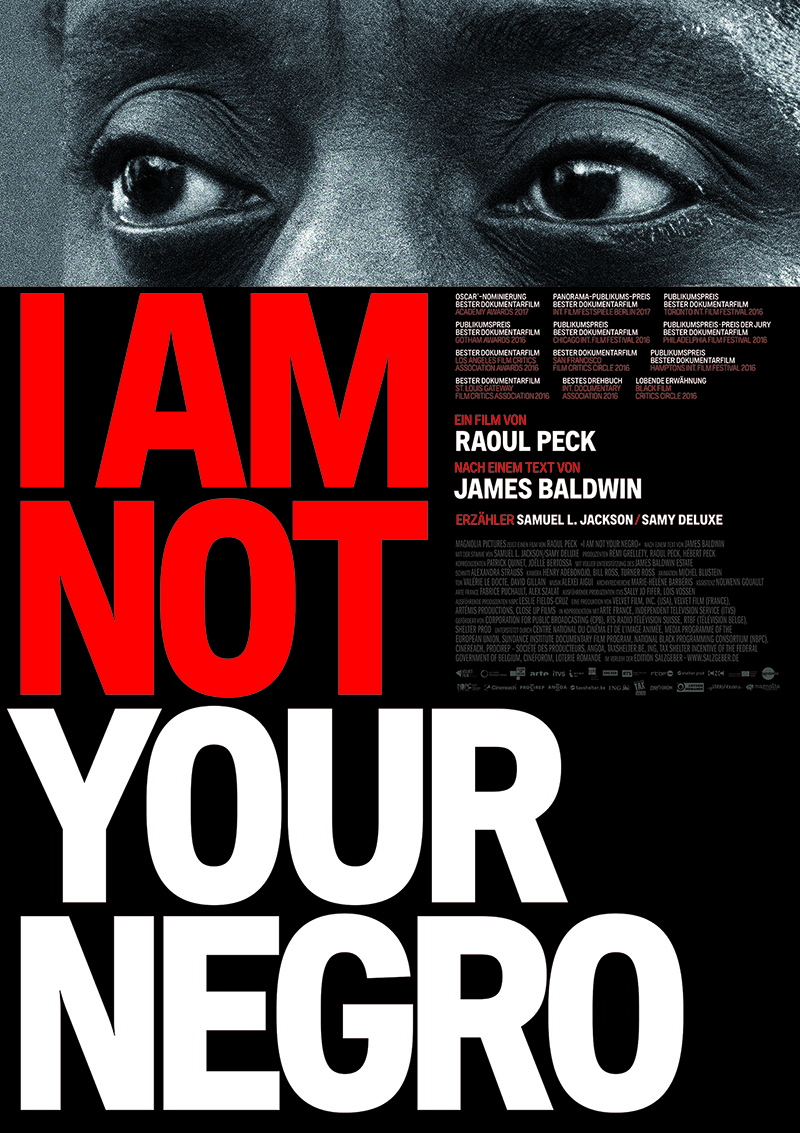 In 1979, James Baldwin wrote a letter to his literary agent describing his next project, "Remember This House." The book was to be a revolutionary, personal account of the lives and assassinations of three of his close friends: Medgar Evers, Malcolm X and Martin Luther King, Jr. At the time of Baldwin's death in 1987, he left behind only 30 completed pages of this manuscript. Filmmaker Raoul Peck envisions the book James Baldwin never finished. - IMDB Synopsis
In 1979, James Baldwin wrote a letter to his literary agent describing his next project, "Remember This House." The book was to be a revolutionary, personal account of the lives and assassinations of three of his close friends: Medgar Evers, Malcolm X and Martin Luther King, Jr. At the time of Baldwin's death in 1987, he left behind only 30 completed pages of this manuscript. Filmmaker Raoul Peck envisions the book James Baldwin never finished. - IMDB Synopsis
Request this Title
MLK/FBI
Sam Pollard (director); Starring Shaun Bowman, Martin Luther King, J. Edgar Hoover (2020)
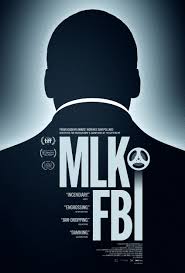 The first film to uncover the extent of the FBI's surveillance and harassment of Martin Luther King, Jr. Based on newly discovered and declassified files, the documentary explores the government's history of targeting Black activists, and the contested meaning behind some of our most cherished ideals. From Emmy Award winning director Sam Pollard and featuring interviews with Andrew Young, James Comey, Clarence Jones, and more. - IMDB Synopsis
The first film to uncover the extent of the FBI's surveillance and harassment of Martin Luther King, Jr. Based on newly discovered and declassified files, the documentary explores the government's history of targeting Black activists, and the contested meaning behind some of our most cherished ideals. From Emmy Award winning director Sam Pollard and featuring interviews with Andrew Young, James Comey, Clarence Jones, and more. - IMDB Synopsis
Request this Title
Us
Jordan Peele (director); Starring Lupita Nyong'o, Winston Duke, Elisabeth Moss (2019)
 In order to get away from their busy lives, the Wilson family takes a vacation to Santa Cruz, California with the plan of spending time with their friends, the Tyler family. On a day at the beach, their young son Jason almost wanders off, causing his mother Adelaide to become protective of her family. That night, four mysterious people break into Adelaide's childhood home where they're staying. The family is shocked to find out that the intruders look like them, only with grotesque appearances. - IMDB Synopsis
In order to get away from their busy lives, the Wilson family takes a vacation to Santa Cruz, California with the plan of spending time with their friends, the Tyler family. On a day at the beach, their young son Jason almost wanders off, causing his mother Adelaide to become protective of her family. That night, four mysterious people break into Adelaide's childhood home where they're staying. The family is shocked to find out that the intruders look like them, only with grotesque appearances. - IMDB Synopsis
Request this Title
BlacKkKlansman
Spike Lee (director); Starring John David Washington, Adam Driver, Laura Harrier (2018)
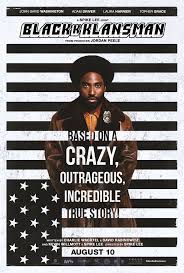 In the early 1970s, Ron Stallworth is hired as the first Black officer in the Colorado Springs, Colorado Police Department. Stallworth is initially assigned to work in the records room, where he faces racial slurs from his coworkers. Stallworth requests a transfer to go undercover, and is assigned to infiltrate a local rally at which national civil rights leader Kwame Ture (birth name Stokely Carmichael) is to give a speech. At the rally, Stallworth meets Patrice Dumas, the president of the black student union at Colorado College. While taking Ture to his hotel, Patrice is stopped by patrolman Andy Landers, a corrupt, racist officer in Stallworth's precinct, who threatens Ture and sexually assaults Patrice. - IMDB Synopsis
In the early 1970s, Ron Stallworth is hired as the first Black officer in the Colorado Springs, Colorado Police Department. Stallworth is initially assigned to work in the records room, where he faces racial slurs from his coworkers. Stallworth requests a transfer to go undercover, and is assigned to infiltrate a local rally at which national civil rights leader Kwame Ture (birth name Stokely Carmichael) is to give a speech. At the rally, Stallworth meets Patrice Dumas, the president of the black student union at Colorado College. While taking Ture to his hotel, Patrice is stopped by patrolman Andy Landers, a corrupt, racist officer in Stallworth's precinct, who threatens Ture and sexually assaults Patrice. - IMDB Synopsis
Request this Title
Bamboozled
Spike Lee (director); Starring Damon Wayans, Savion Glover, Jada Pinkett Smith (2000)
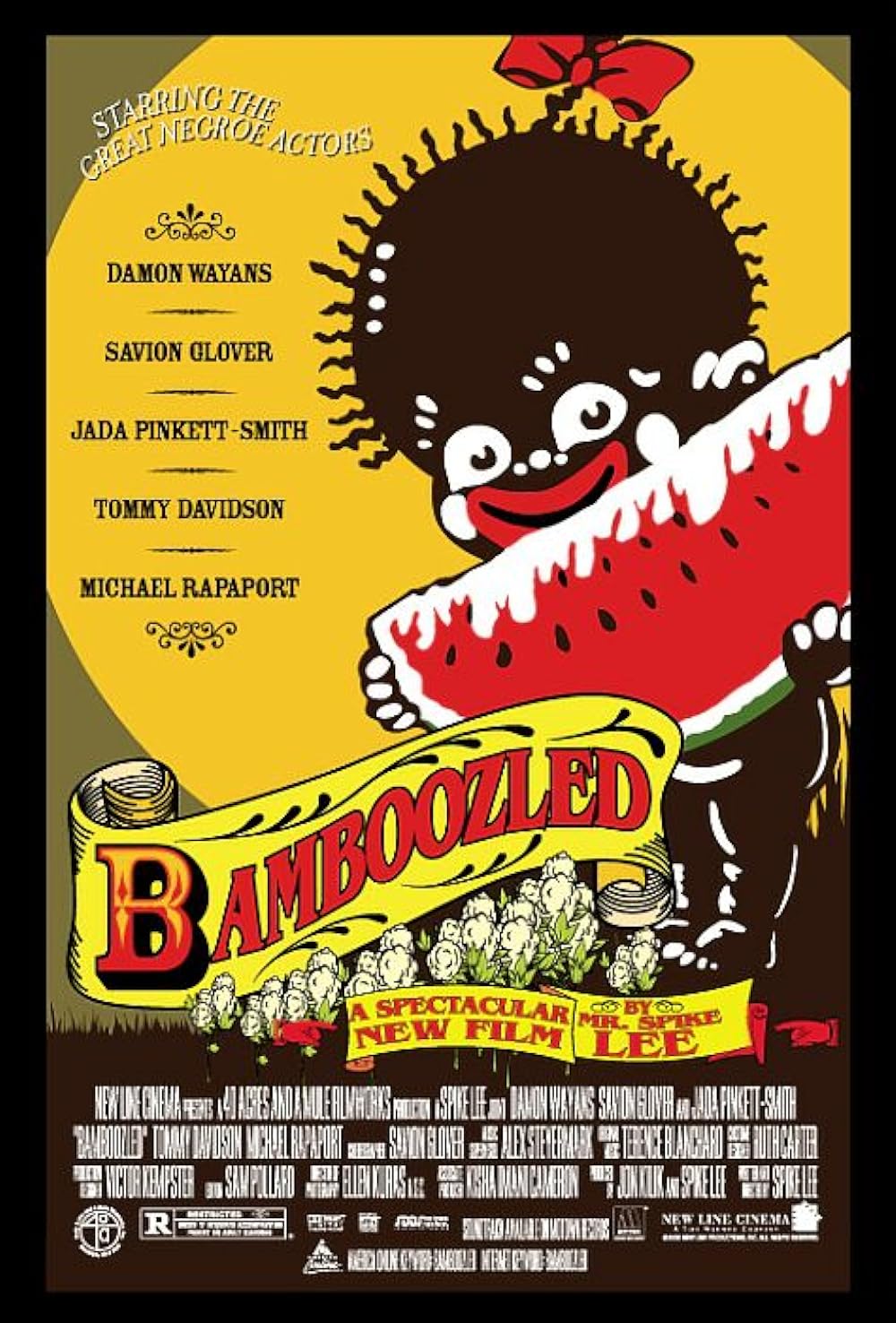 Dark, biting satire of the television industry, focusing on an Ivy League educated black writer at a major network. Frustrated that his ideas for a "Cosby Show"-esque take on the black family have been rejected by network brass, he devises an outlandish scheme: reviving the minstrel show. This is the hook: Instead of white actors in black face, the show stars black actors in even blacker face. The show becomes an instant smash, but with the success also come repercussions for all involved. - IMDB Synopsis
Dark, biting satire of the television industry, focusing on an Ivy League educated black writer at a major network. Frustrated that his ideas for a "Cosby Show"-esque take on the black family have been rejected by network brass, he devises an outlandish scheme: reviving the minstrel show. This is the hook: Instead of white actors in black face, the show stars black actors in even blacker face. The show becomes an instant smash, but with the success also come repercussions for all involved. - IMDB Synopsis
Request this Title
